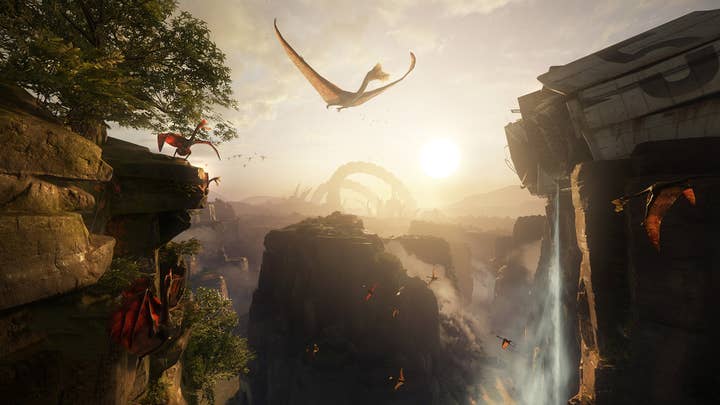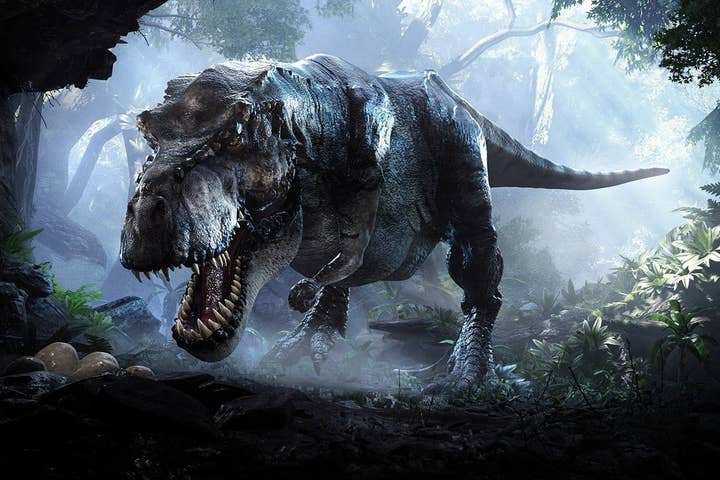Dinosaurs and development tools: Crytek's VR journey
"We believe VR is here to stay and it will transform the way we experience new media"
Crytek's virtual reality demonstration nearly made me fall over. I don't mean that in a hyperbolic, metaphorical way, when I was ziplining up a vertical cliff and a pterodactyl threw a rock into my face I physically lurched, looked down at my feet and felt my legs wobble as my brain struggled to reconcile the rocky abyss it was seeing and the solid ground it could feel.
And that was my first experience of Crytek's consumer foray in the VR world, Robinson: The Journey. It's an exploring adventure packed with Jurassic monsters, but it's also a standard bearer for Crytek's CryEngine, which already supports VR. We spoke to David Bowman, director of production at Crytek, for a quick catch up on the company's efforts in this emerging market.
With the progress in technology and massive investments into the sector, we believe VR is here to stay and it will transform the way we experience new media. VR is the bleeding edge of technology and therefore it maps to our company culture and our focus.
"VR is the bleeding edge of technology and therefore it maps to our company culture and our focus"
Furthermore, for 15 years we have been building tools and an engine for actually primarily creating worlds. Since the beginning of Far Cry, we've built wide and expansive worlds and we pushed it even further with Crysis. We have always been about immersion and immersive worlds, which is a big part of VR as well.
We were approached by many of our existing engine licensees, as well as potential new licensees who were excited by the prospect of developing for the emerging VR headsets. The number of requests has continued to increase as more people begin to understand the potential of this generation of VR, and as we've announced our projects and engine support.
Crytek is famous for constantly pushing what is possible on each platform that we support. Robinson: The Journey will demonstrate that CryEngine excels at rich environments and incredibly detailed experiences while also showing why we are so incredibly excited by developing VR games. This isn't exactly a feeling of pressure; it's the natural result of having powerful tools, incredibly talented developers, and a new medium in which to express ourselves.

We formed a strong working relationship with Oculus and Sony very quickly based on the projects that we wanted to do. Since we are an engine and a technology company as well as a game development studio, we knew we wanted to support as many of the HMDs, input devices, and the hardware needed to power them as possible, so our engine support started with the premise that we would be integrating all viable hardware solutions over time. As I said, Oculus and Sony were driven by projects, and then we started looking at HTC Vive because they have a great HMD as well. We're working with a variety of input device manufactures, while designing our game projects to allow for more than one input device to work.
By definition early adopters will be the initial audience. They are the people who have been waiting for quite some time to have good experiences in VR available to them at a price that is in the same ballpark as other gaming expenses. Of course there are non-gaming experiences and uses that will further push the hardware forward since VR is going to change the way many people view data-architects, doctors, and many other professionals who need to have detailed views at both the intimate level and the grand scale level. Hardware prices will drop over time and become much more powerful.
"Whichever company creates the content that gets those early adopters excited enough to share the experience with friends will go on to be connected with this chapter of game history forever"
It is important though, that there are some great initial experiences for those early adopters so they feel they've spent their money wisely and they share their HMD with their friends and get the 'That's cool!' response. Since VR must be experienced to really be understood, this early group is going to be very important as they will influence their friends and families.
We started on our VR journey purely to support it as a technology, but as soon as our developers (myself included) actually experienced what we could do with this generation of hardware, we knew that we could finally start to tell stories and give experiences which we've been unable to achieve before.
Whichever company creates the content that gets those early adopters excited enough to share the experience with friends will go on to be connected with this chapter of game history forever. There are professional pride and financial benefits to be gained. We know the general price range of the technology, and know that it will progress quickly in power. We all want to learn how to be the best VR developers possible quickly to meet that growth curve.

